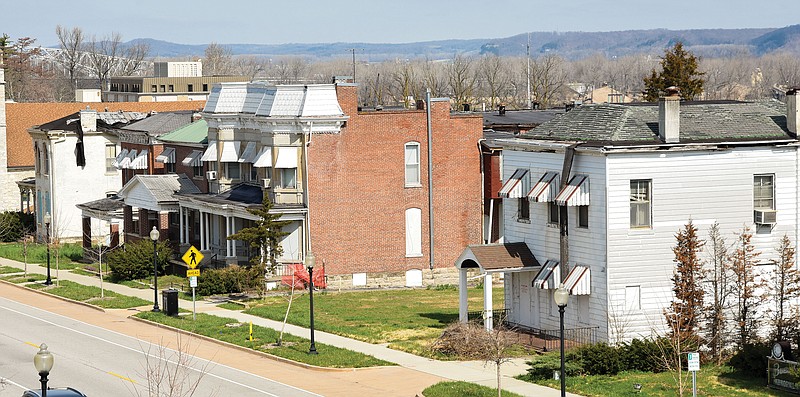Legislation that would make it cheaper for Jefferson City to address abandoned homes along Capitol Avenue passed out of the state Legislature and is awaiting the governor's signature.
Earlier this year, city officials approached state lawmakers about creating legislation that would permit circuit court judges overseeing property condemnation cases to block a property owner from receiving heritage value if a city or municipality can prove the property is abandoned, declared a nuisance, contributes to blight, or is demolished or repaired after a hearing.
Heritage value, codified in state law, is additional worth added to the market price of a property when it's been in the same family for more than 50 years. It's worth 50 percent more than the market value.
Rep. Dave Grifffith and Sen. Mike Bernskoetter, both Republican lawmakers representing Jefferson City, introduced identical bills in the House and Senate to enact the changes this session, but both were stalled after passing out of committees.
Running out of time in the session, Bernskoetter added his bill as an amendment to what became an omnibus local government bill that made it to the governor's desk.
House Bill 1606, sponsored by Rep. Peggy McGaugh, R-Carrollton, contains a multitude of changes for county and city governments, including the changes surrounding heritage value. The bill moved out of a conference committee and was passed by the House and Senate during the final days of session.
It now awaits the governor's signature for approval.
Griffith said the heritage value provision is needed in communities throughout the state, and he doesn't see why Gov. Mike Parson wouldn't sign the bill into law.
"It's not just a Jefferson City issue," he said. "St. Joe has many of the same issues, Cape Girardeau has many of the same issues, certainly Kansas City and St. Louis do, but it's uppermost on our minds because of what's happening over on Capitol Avenue."
Jefferson City leaders began discussing heritage value with state lawmakers because of 14 dilapidated properties along Capitol Avenue that belong to Barbara Buescher. The city has declared them dangerous and unsafe to live in.
Under state law, the city can seize property that is decayed and dangerous -- meaning the building is likely to cause sickness; is structurally unsound and presents safety risks to occupants or the public; or has unsafe or nonexistent equipment like fire detectors and electrical, mechanical or plumbing systems that are a threat to occupants or the public.
Eminent domain cases are heard in circuit courts and the initial fair market property value is determined one of two ways: either by a group of three court-appointed condemnation commissioners or, if either party objects, by a jury.
If the property has been within the same family for at least 50 years, the property owner can argue it has heritage value, which the city would be required to pay on top of the market value.
HB 1606 would allow the judge to not apply the additional heritage value to the city's cost if the property is in poor condition.
With the potential for the city to take condemnation action, City Attorney Ryan Moehlman said the Buescher properties along Capitol Avenue likely would cause a judge to not apply heritage value.
"We think that those properties would fit the definition that is in the bill -- it's not statute yet because the governor needs to sign it," he said. "But we think that those properties would fulfill that definitional standard that we could rightfully ask for an abstention of heritage value."
Moehlman said that would reduce the city's cost in addressing the properties and "make the project more feasible, more achievable."
He said he sees the bill as a way cities can use less taxpayer money to access and develop blighted, and in some cases dangerous, properties.
"It's really something that's going to have an effect on the back end of the acquisition process, if that's the way the City Council decides to go," Moehlman said. "It doesn't really affect anything substantively in terms of the amount of resources that we have to put into the project."
Moehlman said the city hasn't changed its plan from what the council decided in April, which was to demolish 104 and 108 Jackson streets and contract a third-party assessment of the other properties in the Capitol Avenue Neighborhood Conservation Overlay District. After the assessment, the City Council will decide to demolish or bid out the remaining properties for rehabilitation.

